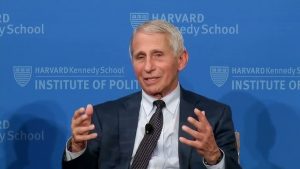As discussions intensify around the rumored pardons, prominent figures like Senator Rand Paul openly criticize Dr. Fauci's controversial past and his alleged involvement in gain-of-function research. The national dialogue brings issues of accountability and partisan divide into sharp focus.
Biden's Potential Pardons Spark Controversy: Fauci Under Fire

Biden's Potential Pardons Spark Controversy: Fauci Under Fire
Speculation emerges regarding President Biden's plans to issue preemptive pardons for individuals like Dr. Anthony Fauci, amid fears of possible persecution should Donald Trump regain the presidency.
The article text:
Speculation is building around President Joe Biden's potential issuance of preemptive pardons aimed at shielding individuals from prosecution should Donald Trump make a comeback in the White House. Among the names discussed is Dr. Anthony Fauci, a key figure who has been at the center of various pandemic-related controversies.
On a recent episode of “The Glenn Beck Program,” Senator Rand Paul addressed these rumors, sharing his views on Fauci's purported role in financing contentious research. “I’ve sent criminal referrals on Anthony Fauci twice to the Department of Justice without a response,” Paul remarked, directing criticism towards Attorney General Merrick Garland. He affirmed that he would send those referrals again should Biden proceed with a preemptive pardon for Fauci.
Paul did not shy away from criticizing Fauci regarding gain-of-function research. “He’s the one that funded it; he’s the one that funded the research in Wuhan,” Paul asserted. He alleged that Fauci circumvented a safety committee intended to examine potentially hazardous research, which enabled risky projects to move forward unchecked. “There have been scientists warning about this for 20 years, and Fauci sidestepped the safeguards in place to prevent exactly what happened,” he elaborated.
Additionally, Paul accused Fauci of minimizing his involvement during inquiries. “Then when it came forward that he had done it, he was like, ‘Oh, nothing to see here,’” Paul commented, calling Fauci’s denials misleading. He characterized Fauci’s statements about the funding of gain-of-function research as “a lie.”
Should a pardon be granted, Paul argued, it would not reduce Fauci's accountability in the public eye. “If the president pardons him, I think it’ll just cement his role in history as being the architect of gain-of-function,” Paul predicted. Glenn Beck echoed his thoughts, suggesting that former Trump appointees, like Kash Patel, might play crucial roles in pursuing due accountability.
As the dialogue regarding Biden's potential preemptive pardons gains traction, the ongoing debate surrounding Fauci’s actions and associated legacy remains divisive. This controversy underscores broader issues related to government accountability, the implications of partisan politics, and the pandemic's long-term fallout.
Speculation is building around President Joe Biden's potential issuance of preemptive pardons aimed at shielding individuals from prosecution should Donald Trump make a comeback in the White House. Among the names discussed is Dr. Anthony Fauci, a key figure who has been at the center of various pandemic-related controversies.
On a recent episode of “The Glenn Beck Program,” Senator Rand Paul addressed these rumors, sharing his views on Fauci's purported role in financing contentious research. “I’ve sent criminal referrals on Anthony Fauci twice to the Department of Justice without a response,” Paul remarked, directing criticism towards Attorney General Merrick Garland. He affirmed that he would send those referrals again should Biden proceed with a preemptive pardon for Fauci.
Paul did not shy away from criticizing Fauci regarding gain-of-function research. “He’s the one that funded it; he’s the one that funded the research in Wuhan,” Paul asserted. He alleged that Fauci circumvented a safety committee intended to examine potentially hazardous research, which enabled risky projects to move forward unchecked. “There have been scientists warning about this for 20 years, and Fauci sidestepped the safeguards in place to prevent exactly what happened,” he elaborated.
Additionally, Paul accused Fauci of minimizing his involvement during inquiries. “Then when it came forward that he had done it, he was like, ‘Oh, nothing to see here,’” Paul commented, calling Fauci’s denials misleading. He characterized Fauci’s statements about the funding of gain-of-function research as “a lie.”
Should a pardon be granted, Paul argued, it would not reduce Fauci's accountability in the public eye. “If the president pardons him, I think it’ll just cement his role in history as being the architect of gain-of-function,” Paul predicted. Glenn Beck echoed his thoughts, suggesting that former Trump appointees, like Kash Patel, might play crucial roles in pursuing due accountability.
As the dialogue regarding Biden's potential preemptive pardons gains traction, the ongoing debate surrounding Fauci’s actions and associated legacy remains divisive. This controversy underscores broader issues related to government accountability, the implications of partisan politics, and the pandemic's long-term fallout.





















